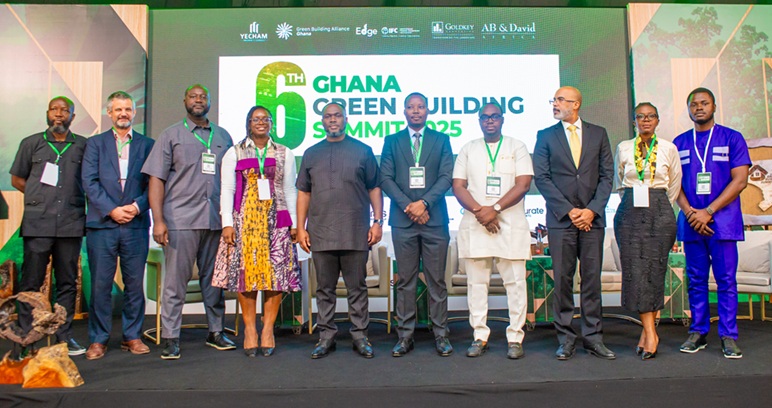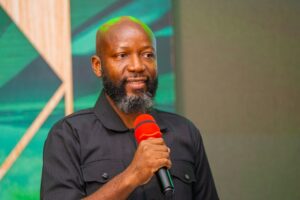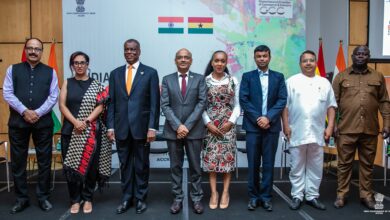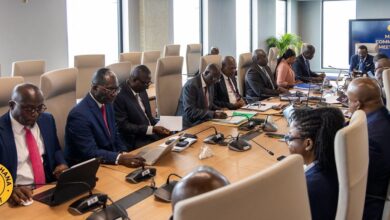Ghana Green Building Summit Charts Bold Path Toward Affordable, Sustainable Housing

The 6th edition of the Ghana Green Building Summit (GGBS) convened in Accra with a powerful message: green buildings must be accessible, inclusive, and central to Ghana’s development agenda—not reserved for the elite.
Held under the theme “Reimagining Buildings and Cities for Economic and Social Prosperity,” the summit brought together over 300 stakeholders from government, academia, the private sector, civil society, and international development institutions. It served as a dynamic platform for dialogue and innovation aimed at driving affordable, sustainable housing in Ghana.
Government Commitment to Green Housing
In a keynote address, Minister for Works, Housing and Water Resources, Hon. Kenneth Gilbert Adjei, reaffirmed government’s commitment to mainstreaming green building practices across national policies.
“We are actively integrating green building principles into our housing strategies,” he said, citing the District Housing Programme as a flagship initiative. The programme aims to provide affordable homes in rural and peri-urban areas using sustainable, locally sourced materials.
Hon. Adjei emphasized that affordability is relative. “What is affordable to me may not be affordable to you,” he noted, calling for a flexible and inclusive approach to housing. He also highlighted the importance of green finance to scale access and implementation of sustainable housing models.
Urgency of Climate Action
Delivering remarks on behalf of the Minister of State for Climate Change and Sustainability, Hon. Issifu Seidu, Technical Director Cedric Dzelu referenced World Bank projections that climate-induced economic losses in Ghana could triple by 2050, with over 30 million people at risk from extreme heat.
“Climate change is not a distant threat—it is already impacting livelihoods, infrastructure, and the very sustainability of our cities,” he warned.
He urged city planners, architects, and policymakers to design urban environments that are resilient, inclusive, and future-ready. “Let us then design cities that breathe. Cities that include. Cities that endure,” he concluded.
Technical Insights: Green Can Be Affordable
Paul Kwesi Ocran, Green Buildings Lead at the International Finance Corporation (IFC) Ghana, presented compelling evidence that sustainable housing can be cost-effective. He highlighted case studies from Accra and Tamale where low-tech solutions—like reflective roofing and energy-efficient lighting—led to over 30% savings in water and energy.
“We should not always associate green buildings with ten-storey towers. Your home can be green too,” he stated, challenging perceptions that green design is only for high-end developments.
Empowering Youth and Rethinking Affordability
John Sheriff Bawah, Managing Director of State Housing Company Limited (SHCL), called for a national dialogue on what constitutes “affordable” housing in Ghana. “It ranges from $60,000 to $250,000—yet everyone tags it affordable. That’s the problem,” he said.
He lauded the summit for amplifying youth innovation, highlighting Joel Jojo Osam Mensah, winner of the 3rd IFC EDGE Student Design Competition. Mensah’s design, Nɔte Dan (Earth House), achieved over 50% efficiency in energy and water use through passive cooling, rammed earth walls, and natural ventilation.
In a surprise announcement, Bawah offered Mensah a job at SHCL—an offer the sector minister heartily endorsed—underscoring the summit’s practical impact on young talent in Ghana’s built environment.
Legal, Financial and Global Perspectives
Yewande Giwa, Senior Operations Officer at IFC, credited the UK and Swiss governments for supporting green finance tools and capacity-building programs across Africa. “What if every new building in Ghana met the EDGE standard? The climate impact would be phenomenal,” she posed.
Vera Owusu-Osei, Partner at AB & David Africa, emphasized the need to align legal, investment, and environmental strategies. “This summit shows what’s possible when innovation, policy, and legal support intersect,” she said.
Richard Sandall, Development Director at the British High Commission, emphasized that green buildings are not a luxury but a necessity. “We must think beyond technology to the political and commercial systems shaping demand and value,” he said.
Panel Discussions Drive Action
The summit featured six interactive panel sessions focused on building a sustainable ecosystem for green housing and infrastructure:
-
Panel 1: The Business Case for Green Affordable Housing
-
Panel 2: Reimagining Public Spaces for Well-being and Operational Efficiency
-
Panel 3: Urban Policy and Models for Livable African Cities
-
Panel 4: ESG at the C-Suite Level – Building Business Resilience
-
Panel 5: Unlocking Climate Finance for Project Pipeline Development
-
Panel 6: Innovative Green Infrastructure, Energy, and E-Mobility Solutions
Evolution of the Ghana Green Building Summit
Founded in 2017, GGBS has become a key platform for shaping Ghana’s sustainable development policies. In 2019, it was named Green Event of the Year at the Ghana Property Awards.
Over the years, the summit has expanded its mission from thought leadership to actionable impact, including youth and women empowerment, project pipeline development, and SME support. From 2025, the platform will transition into the broader Ghana Green Summit, encompassing the full spectrum of sustainability across the value chain.

A Call for Collective Action
Summit Convener Cyril Nii Ayitey Tetteh summed it up in his opening address: “Sustainability is about continuity. That only happens when we embed it into our processes—from ESG frameworks to sustainable banking.”
The 2025 Ghana Green Building Summit ended with a renewed sense of urgency and unity, as stakeholders pledged to continue building a greener, fairer Ghana—one home, one city, and one innovation at a time.




